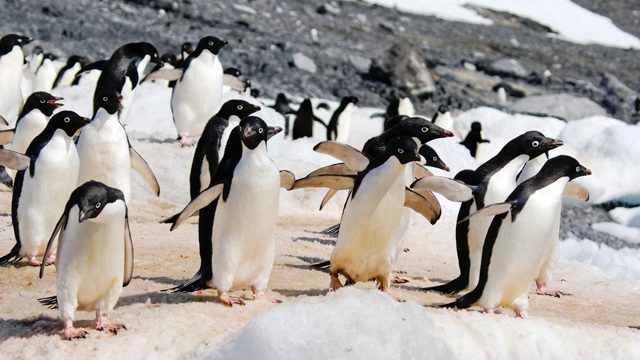SUMMARY
This is AI generated summarization, which may have errors. For context, always refer to the full article.

SYDNEY, Australia (UPDATED) – Tens of thousands of Antarctic penguins are estimated to be unable to return to their colony* after a massive iceberg grounded there, according to a newly published study.
The B09B iceberg, measuring some 100 square kilometers (38.6 square miles), grounded in Commonwealth Bay in East Antarctica in December 2010, the researchers from Australia and New Zealand wrote in the Antarctic Science journal.
The Adelie penguin population at the bay’s Cape Denison was measured to be about 160,000 in February 2011 but by December 2013 it had plunged to an estimated 10,000, they said.
The iceberg’s grounding meant the penguins had to walk more than 60 kilometers (37 miles) to find food, impeding their breeding attempts, said the researchers from the University of New South Wales’ (UNSW) Climate Change Research Centre and New Zealand’s West Coast Penguin Trust.
“The Cape Denison population could be extirpated within 20 years unless B09B relocates or the now perennial fast ice within the bay breaks out,” they wrote in the research published in February.
Fast ice is sea ice that forms and stays fast along the coast.
During their census in December 2013, the researchers said “hundreds of abandoned eggs were noted, and the ground was littered with the freeze-dried carcasses of previous season’s chicks”.
“It’s eerily silent now,” UNSW’s Chris Turney, who led the 2013 expedition, told the Sydney Morning Herald.
“The ones that we saw at Cape Denison were incredibly docile, lethargic, almost unaware of your existence.
“The ones that are surviving are clearly struggling. They can barely survive themselves, let alone hatch the next generation. We saw lots of dead birds on the ground… it’s just heartbreaking to see.”
In contrast, penguins living on the eastern fringe of the bay just eight kilometres from the fast ice edge were thriving, the scientists said.
The researchers said the study had “important implications” for the wider East Antarctic if the current trend of increasing sea ice continued.
Sea ice around Antarctica is increasing, in contrast to the Arctic where global warming is causing ice to melt and glaciers to shrink.
Scientists believe the growth in Antarctic sea ice is largely driven by changes in wind and local conditions.– Rappler.com
* Editor’s Note: In an earlier version of this story, Agence France-Presse (AFP) reported that the 150,000 penguins died after iceberg grounding. On Saturday, February 20, AFP issued a correction, saying the penguins were only unable to return home due to the grounding.
Add a comment
How does this make you feel?
There are no comments yet. Add your comment to start the conversation.